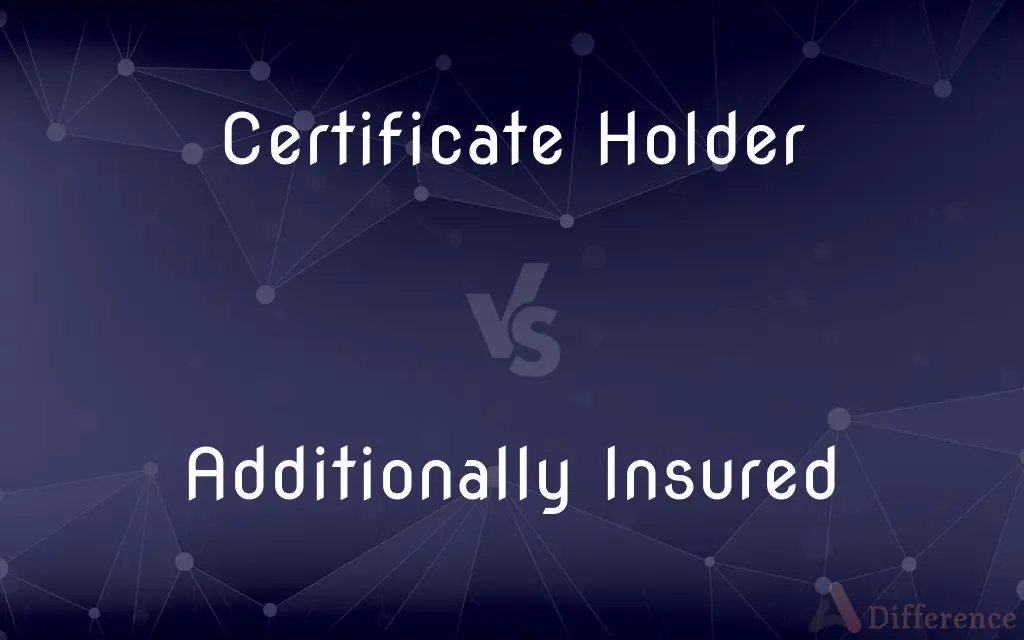Certificate Holder vs. Additionally Insured — What's the Difference?
Edited by Tayyaba Rehman — By Fiza Rafique — Published on January 10, 2024
Certificate Holder is an entity listed on a policy's certificate of insurance. Additionally Insured is party added to another's policy for shared coverage.

Difference Between Certificate Holder and Additionally Insured
Table of Contents
ADVERTISEMENT
Key Differences
This term refers to an entity or individual who is named on a certificate of insurance. The certificate is a document proving the existence of an insurance policy. The holder, however, does not receive the benefits of the policy.
In contrast, an additionally insured is an entity or person added to an insurance policy. This addition extends some of the policy's protection to this third party. The coverage is typically related to specific liabilities or risks associated with the relationship between the policyholder and the additionally insured.
For the certificate holder, the primary benefit is proof of insurance. For instance, a landlord may require tenants to list them as certificate holders on renters’ insurance policies. This demonstrates that the tenant has the necessary coverage.
On the other hand, an additionally insured party gains actual coverage under the policyholder’s insurance. For example, a company might be added as additionally insured to a contractor's policy. This provides the company with protection against liabilities arising from the contractor’s work.
A certificate holder is essentially an informed party, but not a covered party. They receive notifications about changes or cancellations in the policy, but they don't receive direct insurance benefits.
ADVERTISEMENT
Conversely, being additionally insured means sharing in the protection. It's a common practice in business relationships where risks are shared or transferred, providing a safety net for all involved parties.
Comparison Chart
Coverage
No direct coverage provided.
Receives coverage under the policy.
Purpose
To show proof of insurance.
To extend policy protection to a third party.
Notifications
Informed about policy changes or cancellations.
Covered, hence directly affected by policy changes.
Financial Benefits
No claims or financial benefits.
Can claim and receive financial benefits under the policy.
Relationship with Policy
Named on the certificate but not on the policy itself.
Added to the policy, sharing in the policyholder's risks.
Compare with Definitions
Certificate Holder
A party receiving proof of another’s insurance coverage.
As the property owner, she was the certificate holder on the renter's policy.
Additionally Insured
An individual or organization added for coverage to an insurance policy.
As additionally insured, the event organizer was covered under the venue's insurance policy.
Certificate Holder
An entity named on a certificate as evidence of insurance.
The contractor was listed as a certificate holder on the client's liability insurance.
Additionally Insured
A third party receiving coverage under an existing insurance policy.
As additionally insured, the subcontractor was protected under the contractor’s policy.
Certificate Holder
A person or organization with an interest in being informed about an insurance policy.
The bank became a certificate holder on the homeowner's insurance during the mortgage term.
Additionally Insured
A person or entity added to another’s insurance policy for shared protection.
The landlord was named as additionally insured on the tenant’s liability insurance.
Certificate Holder
A party identified on an insurance certificate without receiving coverage.
The subcontractor's client was simply a certificate holder, not covered under the policy.
Additionally Insured
A party who shares in the insurance benefits of the policyholder.
The franchisor was an additionally insured entity on the franchisee's business insurance.
Certificate Holder
An entity that holds a document verifying insurance coverage but not benefits.
The event venue required all vendors to list them as certificate holders on their policies.
Additionally Insured
An entity included in a policyholder’s insurance for specific risks.
The manufacturer was listed as additionally insured on the supplier's insurance for product liability.
Common Curiosities
Can an additionally insured file a claim under the policy?
Yes, an additionally insured can file claims and receive coverage benefits under the policy they are added to.
Why would someone be listed as a certificate holder?
Typically, for verification purposes, to prove that another party (like a tenant or contractor) has the necessary insurance coverage.
What is a certificate holder?
A certificate holder is an entity or individual named on a certificate of insurance, indicating proof of another's insurance policy.
What kind of information is on a certificate of insurance?
It typically includes details like the type of coverage, policy limits, and the names of the insured and certificate holder.
Is it common for landlords to be additionally insured?
Yes, landlords are often made additionally insured on tenants' liability policies for added protection.
Can a business be both a certificate holder and additionally insured?
Yes, depending on the circumstances and agreements, a business can be both.
Are there limitations to the coverage for an additionally insured?
Yes, coverage for an additionally insured is typically limited to liabilities or risks associated with their relationship with the policyholder.
What does it mean to be additionally insured?
Being additionally insured means being added to someone else's insurance policy for shared coverage and protection against specific risks.
Does a certificate holder receive insurance coverage?
No, a certificate holder does not receive direct insurance coverage or benefits from the policy.
In what scenarios is someone made additionally insured?
This usually occurs in business relationships, like between contractors and clients, where shared risks necessitate shared coverage.
Are certificate holders notified about policy changes?
Yes, certificate holders are generally informed about changes or cancellations in the policy.
Do certificate holders have any rights to modify the insurance policy?
No, certificate holders do not have rights to modify or control the insurance policy.
Does a certificate of insurance expire?
Yes, it usually coincides with the policy term and needs renewal or updating when the policy changes or is renewed.
Does being additionally insured cost extra?
It can, as adding an additionally insured party to a policy may increase the premium due to the extended coverage.
Can an individual be an additionally insured on a corporate policy?
Yes, if the individual's involvement warrants it, they can be added as additionally insured.
Share Your Discovery

Previous Comparison
Carbonyl Iron vs. Ferrous Ascorbate
Next Comparison
Mitochondrial DNA vs. Nuclear DNAAuthor Spotlight
Written by
Fiza RafiqueFiza Rafique is a skilled content writer at AskDifference.com, where she meticulously refines and enhances written pieces. Drawing from her vast editorial expertise, Fiza ensures clarity, accuracy, and precision in every article. Passionate about language, she continually seeks to elevate the quality of content for readers worldwide.
Edited by
Tayyaba RehmanTayyaba Rehman is a distinguished writer, currently serving as a primary contributor to askdifference.com. As a researcher in semantics and etymology, Tayyaba's passion for the complexity of languages and their distinctions has found a perfect home on the platform. Tayyaba delves into the intricacies of language, distinguishing between commonly confused words and phrases, thereby providing clarity for readers worldwide.












































